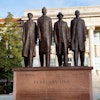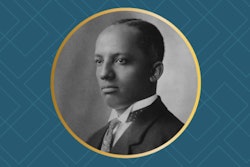Earlier this summer, Dr. Yohuru Williams and his wife were enjoying what was supposed to be a routine ride on the New Jersey Turnpike.
Williams—a prominent Black historian who holds a Distinguished University Chair and is the Founding Director of the Racial Justice Initiative at the University of St. Thomas in Minneapolis—had flown into New York City, rented a compact car at LaGuardia airport, and was making his way to his alma mater, the University of Scranton, where he was set to receive an alumni award for his distinguished service.
What was supposed to be a momentous and joyful occasion, quickly turned into every Black man’s worst nightmare when Williams—who was in the driver’s seat—was pulled over by a New Jersey state trooper and peppered with a litany of bizarre questions after he was accused of “driving too slow.”
The encounter at 9:15 a.m. on June 9 near the Delaware Water Gap was caught on video and raises new questions about the history of policing along the busy thoroughfare 25 years after four young men—three Black and one Hispanic—were pulled over and shot by New Jersey state troopers while driving to North Carolina Central University for a basketball competition. Dr. Yohuru Williams
Dr. Yohuru Williams
That case, which left Danny Reyes, Rayshawn Brown, LeRoy Jarmaine Grant and Keshon Moore injured, made national headlines and sparked around-the-clock protests organized by Reverend Al Sharpton and other civil rights leaders who shut down parts of the turnpike to demand justice for the New Jersey Four.
Ultimately, the late civil rights attorney, Johnnie Cochran, successfully secured a $12.95 million settlement for the young men in 2001, but not before the New Jersey state police was forced to undergo federal oversight including ongoing monitoring of its practices with the goal of eliminating racial profiling across the state. In 2000, it was revealed that state police commanders knew troopers were targeting minority drivers at least three years before the state admitted racial profiling existed. A state report noted that in a three-month period in 1994, 94 percent of New Jersey Turnpike motorists stopped by troopers were minorities.






















